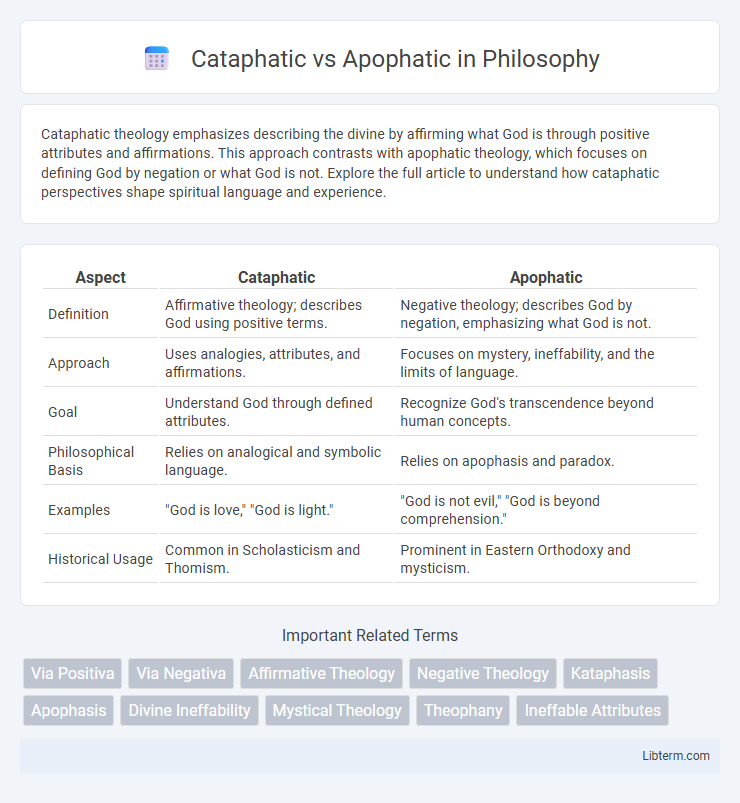Cataphatic theology emphasizes describing the divine by affirming what God is through positive attributes and affirmations. This approach contrasts with apophatic theology, which focuses on defining God by negation or what God is not. Explore the full article to understand how cataphatic perspectives shape spiritual language and experience.
Table of Comparison
| Aspect | Cataphatic | Apophatic |
|---|---|---|
| Definition | Affirmative theology; describes God using positive terms. | Negative theology; describes God by negation, emphasizing what God is not. |
| Approach | Uses analogies, attributes, and affirmations. | Focuses on mystery, ineffability, and the limits of language. |
| Goal | Understand God through defined attributes. | Recognize God's transcendence beyond human concepts. |
| Philosophical Basis | Relies on analogical and symbolic language. | Relies on apophasis and paradox. |
| Examples | "God is love," "God is light." | "God is not evil," "God is beyond comprehension." |
| Historical Usage | Common in Scholasticism and Thomism. | Prominent in Eastern Orthodoxy and mysticism. |
Introduction to Cataphatic and Apophatic Theology
Cataphatic theology, also known as positive theology, emphasizes describing the divine through affirmations, using attributes and analogies to articulate God's nature. In contrast, apophatic theology, or negative theology, focuses on what cannot be said about the divine, highlighting God's transcendence by negation and silence. Both approaches seek to understand God, with cataphatic theology providing conceptual frameworks and apophatic theology acknowledging the limitations of human language in capturing divine essence.
Defining Cataphatic (Positive) Theology
Cataphatic theology defines God through affirmative statements and descriptive language, emphasizing what God is by attributing positive qualities such as omnipotence, omniscience, and benevolence. This approach uses scripture, tradition, and rational reflection to articulate divine attributes and affirm God's nature in accessible terms. Cataphatic theology contrasts with apophatic theology by focusing on the knowability and expressibility of the divine essence rather than its ineffability.
Defining Apophatic (Negative) Theology
Apophatic theology, also known as negative theology, defines the divine by emphasizing what cannot be said about God, highlighting God's ineffability and transcendence beyond human concepts. It asserts that God surpasses all affirmative descriptions, encouraging a spiritual approach characterized by silence, contemplation, and withdrawal from finite language. This theological method contrasts with cataphatic theology, which seeks to define God through positive attributes and affirmations.
Historical Origins and Development
The cataphatic and apophatic approaches to theology originated in early Christian thought, with roots tracing back to the Hellenistic philosophical traditions. Cataphatic theology, also known as positive theology, seeks to describe God using affirmations and analogies based on scripture and experience, while apophatic theology emphasizes the ineffability and mystery of the divine by focusing on what cannot be said about God. Historical development of these theological methods is evident in the writings of Church Fathers such as Pseudo-Dionysius the Areopagite, who synthesized both approaches, influencing Eastern Orthodox and Western Christian mystical traditions throughout the medieval period.
Key Thinkers and Proponents
Key thinkers in cataphatic theology include Thomas Aquinas and Augustine, who emphasized positive affirmations about God through scripture and reason. Apophatic theology is championed by Pseudo-Dionysius the Areopagite and Gregory of Nyssa, advocating for understanding God by negation and emphasizing divine mystery. Both approaches significantly influence Christian mystical traditions and theological discourse.
Philosophical Foundations
Cataphatic theology asserts that human language can positively describe the nature of the divine through affirmations and attributes, grounding its philosophical foundation in analogical reasoning and metaphysical realism. Apophatic theology emphasizes the ineffability of the divine, positing that God transcends all human concepts and can only be approached through negation and the elimination of false attributes, deeply rooted in negative ontology and mystical traditions. These contrasting approaches highlight fundamental differences in epistemology and ontology within the philosophy of religion regarding the limits of human knowledge about ultimate reality.
Approach to the Divine: Affirmation vs. Negation
Cataphatic theology employs affirmative language to describe the Divine, emphasizing positive attributes and qualities such as love, mercy, and omnipotence. Apophatic theology, by contrast, adopts negation, asserting what the Divine is not, highlighting the ineffability and transcendence beyond human comprehension. This fundamental difference shapes theological discourse by either defining God through known attributes or by emphasizing God's mystery through silence and paradox.
Practical Implications in Spirituality
Cataphatic spirituality emphasizes affirming positive attributes of the divine through prayer, scripture, and imagery, fostering a relatable and tangible connection for practitioners. Apophatic spirituality, by contrast, involves embracing divine mystery through negation and silence, encouraging a direct experiential awareness beyond words and concepts. Together, these approaches influence practices by balancing devotional expression with contemplative transcendence in spiritual growth.
Major Critiques and Controversies
Cataphatic theology, which describes God through positive affirmations and attributes, faces criticism for potentially limiting the divine mystery by imposing human concepts on the infinite. Apophatic theology emphasizes God's ineffability and uses negation to express what God is not, leading to debates about whether this approach risks veering into agnosticism or undermining meaningful discourse about the divine. The major controversy revolves around balancing affirmations and negations, with critics arguing that both methods can either diminish God's transcendence or render theological statements too abstract for practical spiritual engagement.
Cataphatic and Apophatic in Modern Religious Thought
Cataphatic theology employs positive affirmations to describe the divine, emphasizing God's qualities through scripture and tradition, making it accessible and relatable in modern religious discourse. Apophatic theology, by contrast, highlights the ineffability of God, using negation to assert that divine essence surpasses human comprehension, which fosters humility and mystery in contemporary spirituality. Modern religious thought integrates both approaches, balancing cataphatic clarity with apophatic transcendence to deepen theological exploration and personal faith experience.
Cataphatic Infographic

 libterm.com
libterm.com